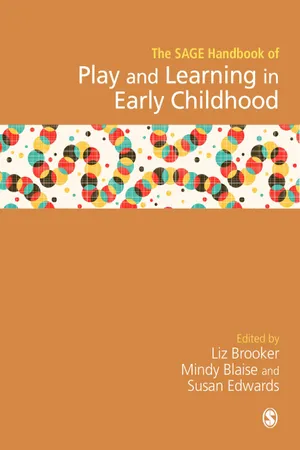
SAGE Handbook of Play and Learning in Early Childhood
- 448 pages
- English
- ePUB (mobile friendly)
- Available on iOS & Android
SAGE Handbook of Play and Learning in Early Childhood
About this book
?This Handbook offers diverse perspectives from scholars across the globe who help us see play in new ways. At the same time the basic nature of play gives a context for us to learn new theoretical frameworks and methods. A real gem!?
- Beth Graue, Department of Curriculum and Instruction, Wisconsin Center for Education Research, USA
Play and learning scholarship has developed considerably over the last decade, as has the recognition of its importance to children's learning and development.
Containing chapters from highly respected researchers, whose work has been critical to building knowledge and expertise in the field, this Handbook focuses on examining historical, current and future research issues in play and learning scholarship.
Organized into three sections which consider:
- theoretical and philosophical perspectives on play and learning
- play in pedagogy, curriculum and assessment
- play contexts.
The Handbook?s breadth, clarity and rigor will make it essential reading for researchers and postgraduate students, as well as professionals with interest in this dynamic and changing field.
Liz Brooker is Reader in Early Childhood in the Faculty of Children and Learning at the Institute of Education, University of London.
Mindy Blaise is an Associate Professor of Early Childhood Education in the Department of Early Childhood Education at the Hong Kong Institute of Education.
Susan Edwards is Associate Professor in Curriculum and Pedagogy at Australian Catholic University.
This handbook?s International Advisory Board included:
Jo Aliwood, The University of Newcastle, Australia
Pat Broadhead, Leeds Metropolitan University, Australia
Stig Brostrom, Aarhus University, Denmark
Hasina Ebrahim, University of the Free State, South Africa
Beth Graue, Wisconsin Center for Education Research, USA
Amita Gupta, The City College of New York, CUNY, USA
Marjatta Kalliala, University of Helsinki, Finland
Rebecca Kantor, University of Colorado Denver, USA
Colette Murphy, Trinity College, Dublin, Republic of Ireland
Ellen Sandseter, Queen Maud University College of Early Childhood Education, Norway
Frequently asked questions
- Essential is ideal for learners and professionals who enjoy exploring a wide range of subjects. Access the Essential Library with 800,000+ trusted titles and best-sellers across business, personal growth, and the humanities. Includes unlimited reading time and Standard Read Aloud voice.
- Complete: Perfect for advanced learners and researchers needing full, unrestricted access. Unlock 1.4M+ books across hundreds of subjects, including academic and specialized titles. The Complete Plan also includes advanced features like Premium Read Aloud and Research Assistant.
Please note we cannot support devices running on iOS 13 and Android 7 or earlier. Learn more about using the app.
Information
Table of contents
- Cover
- Half Title
- Editorial Board
- Title Page
- Acknowledgements
- Copyright Page
- Contents
- About the Editors
- Notes on Contributors
- Acknowledgements
- Editors’ Note on Terminology
- Introduction
- PART I Theoretical Perspectives on Play and Learning
- 1 Foundations of Play Theory
- 2 Play in the Non-classical Psychology of L.S. Vygotsky
- 3 Children’s Play as Cultural Activity
- 4 Make-believe Play and Self-regulation
- 5 Cultural–historical Perspectives on Play: Central Ideas
- 6 Postcolonial and Anti-racist Approaches to Understanding Play
- 7 New Materialisms and Play
- 8 Childhood Studies and Play
- 9 Ethical Dimensions and Perspectives on Play
- 10 Gender Discourses and Play
- 11 Studying Play through New Research Practices
- PART II Play and Learning in Pedagogy, Curriculum and Assessment
- 12 The Play–pedagogy Interface in Contemporary Debates
- 13 Developmental Play in the Classroom
- 14 Children’s Play and Learning and Developmental Pedagogy
- 15 Play Provisions and Pedagogy in Curricular Approaches
- 16 Children’s Content Learning in Play Provision: Competing Tensions and Future Possibilities
- 17 Professional Preparation for a Pedagogy of Play
- 18 Learning Mathematics through Play
- 19 Play as the Precursor for Literacy Development
- 20 Understanding Narrative as a Key Aspect of Play
- 21 Physical Play and Development
- 22 Play and Playfulness: Issues of Assessment
- PART III The Play–pedagogy Interface in Contemporary Debates
- 23 Whose Play? Children, Play and Consumption
- 24 Children’s Right to Play
- 25 Infant and Toddler Play
- 26 Children’s Perspectives on Play
- 27 Digital Play
- 28 Play in Peer Cultures
- 29 The Impact of Race and Culture on Play in Early Childhood Classrooms
- 30 Playfulness and the Co-construction of Identity in the First Years
- 31 Connecting Home and Educational Play: Interventions that Support Children’s Learning
- 32 Opportunities and Affordances in Outdoor Play
- 33 Media, Popular Culture and Play
- Index